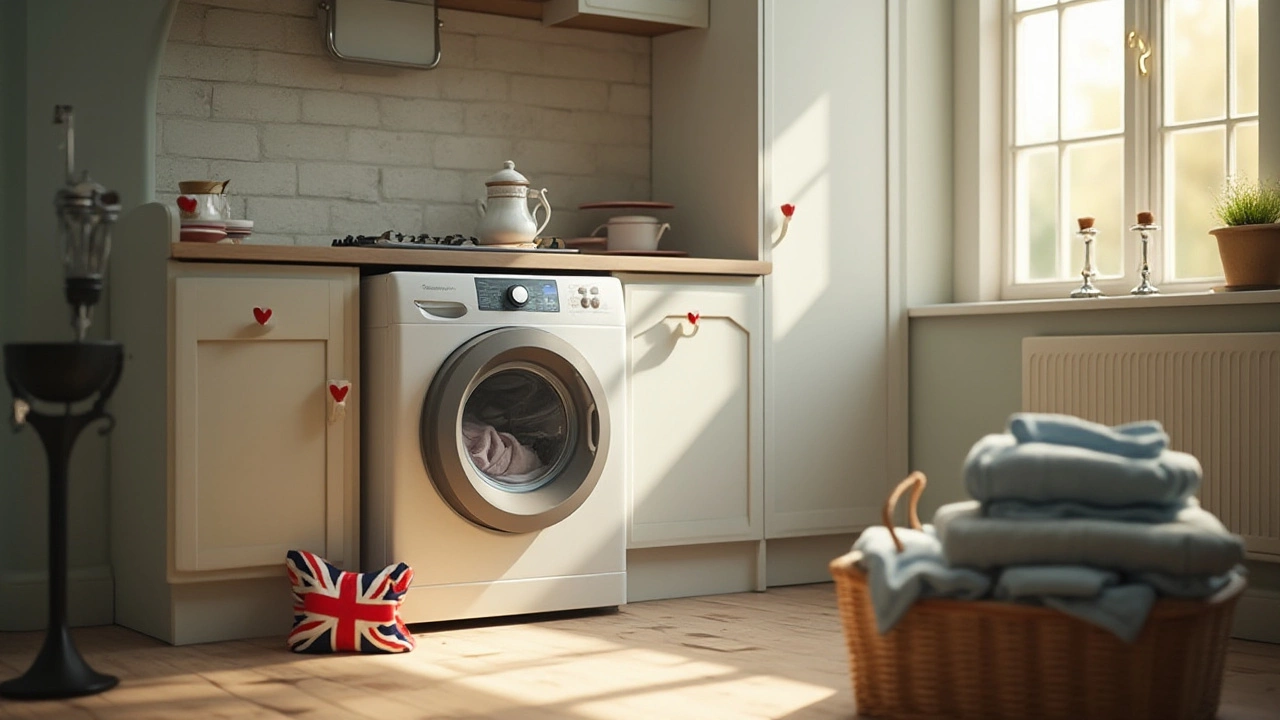Washing machines are the unsung heroes of household chores, tirelessly tackling piles of laundry day in and day out. No one buys a washing machine expecting it to last forever, but how long should one truly last? This question looms large for anyone looking to maximize their appliance investment.
The average lifespan of a washing machine can vary significantly, relying on numerous factors such as brand, usage frequency, and maintenance practices. Whether it's a sleek front-loader or a dependable top-loader, understanding what contributes to a washing machine's longevity can save you from unnecessary headaches and expenses.
Join us as we dive into the lifespan of washing machines, exploring what impacts their durability, and gleaning insights into keeping yours running smoothly for years to come.
- Understanding Washing Machine Lifespan
- Factors Affecting Durability
- Signs Your Washer Needs Attention
- Maintenance Tips for Longevity
- Choosing the Right Model for Lasting Performance
- When to Opt for Repairs or Replacement
Understanding Washing Machine Lifespan
When it comes to washing machine lifespan, the number of cycles a machine is built to endure is often a major indicator. On average, a well-manufactured washing machine is expected to last approximately 10 to 15 years. This translates to roughly 2,000 to 2,500 cycles over its lifetime. Several factors, including the type of washing machine, its brand, and how it is maintained, significantly influence this estimation. Both front-loading and top-loading designs each come with their own sets of advantages and potential lifespans, providing unique experiences depending on your laundry habits. Front-loaders tend to be more energy and water-efficient, while top-loaders often offer more durability and a longer lifespan.
According to Consumer Reports, "Regular maintenance and proper use play pivotal roles in extending your washing machine’s life." Simple practices, like using the correct detergent and regularly cleaning the machine, can make a massive difference.The washing machine brand is also a critical factor in understanding its longevity. Some brands have made a name for themselves by producing long-lasting and reliable machines—companies such as Whirlpool and Samsung have topped many consumer ratings for their durable appliances. Not all brands maintain the same continuous quality, so doing prior research could potentially add several years to your appliance's life.
Other influential aspects include usage frequency and load size, as these can wear out essential components more quickly if not managed properly. To maximize washer durability, it's recommended not to exceed the load capacity, which helps avoid damage to the drum and motor. Maintaining a regular cleaning schedule also prevents mold and mildews, which could save your washing machine from breakdowns beyond repair. It's fascinating how these everyday practices can make a big difference in maintaining an appliance that's quite critical for maintaining a clean and organized home.
Factors Affecting Durability
When it comes to gauging the lifespan of a washing machine, several factors come into play, each weaving its thread into the fabric of durability. One of the primary influences is the brand and model of the appliance. Brands renowned for their reliability, such as Miele or Bosch, often manufacture machines with parts crafted to endure heavy use, whereas budget models might offer less in terms of longevity due to the materials used.
Then there's the matter of usage frequency. A household with a bustling family, using the washing machine daily, understandably experiences more wear and tear compared to a single person's occasional use. The heavier the load, the harder your machine has to work, impacting its long-term performance. But it's not just about how often you use it; how you use it is equally pivotal. Overloading a machine can stress the motor and drum, leading to premature wear.
Let's not forget maintenance practices. A well-maintained machine can surprise you with its longevity. Regularly cleaning the drum, using the right detergent, and descaling your washing machine can prevent the build-up that often leads to malfunction. Simple practices like leaving the door ajar to prevent mold growth can add years to the appliance's life.
According to the Appliance Manufacturers Association, “Proper maintenance can extend a washing machine's lifespan by up to 5 years.”
Environmental conditions also deserve a spotlight. If your washing machine resides in a damp basement, you might see issues sooner due to corrosion. High humidity levels can affect the electronics and metal parts, and it's something to be mindful of. Additionally, water quality can play a role. Hard water can be harsh on a washing machine's internal mechanisms, leading to scale build-up and subsequent issues if not addressed regularly.
Material Quality and Technological Advances
The materials used in the construction of washing machines have evolved, and technological advancements have played a significant role in increasing their average lifespan. Machines built with high-grade stainless steel drums are typically more resilient than those with plastic components. These drums withstand higher spin speeds and are less susceptible to damage over time.
Technological improvements like direct drive motor systems, found in many modern machines, reduce the number of moving parts that can fail. However, these advancements come with more complex electronics, which are not immune to issues. Still, for those who diligently monitor water quality and machine settings, these machines offer a higher resilience to frequent washing cycles.
In a world where efficiency is key, understanding these factors not only helps in choosing a washing machine that promises longevity but also empowers you to make smarter choices in daily usage, ensuring your trusted appliance's companionship lasts as long as possible.

Signs Your Washer Needs Attention
Like any reliable appliance, washing machines tend to give off subtle hints that they might be heading into troublesome territory. Ignoring these signs could mean the difference between a quick fix and a costly replacement. One of the most telling signs that your faithful laundry companion may be in distress is unusual noise. If your washing machine begins to sound like a construction site, it’s often a sign of parts wearing out or needing adjustment. Such sounds could point to issues with the drum, motor, or even the bearings, and addressing these early can prevent more significant problems down the line.
Another clear signal is water leaks. The sight of puddles pooling beneath your washing machine can spell trouble. While the usual suspects for leaks include faulty hoses, loose connections, or worn-out seals, neglecting these can lead to water damage in your laundry area. An inconsistent water level during cycles is also a warning beacon that your washing machine needs some expert assessment. Water not filling to the correct level often results from a malfunctioning inlet valve or a failing pressure switch.
Washing machine maintenance not only involves fixing issues but also recognizing patterns of irregularities over time.
“Regularly reviewing the sound and efficiency of your appliances can save considerable amounts on repair bills,” says a technician at a renowned repair center.If clothes emerge from a wash still soapy or wet, it could hint at faults in the drainage system or the spin cycle, warranting immediate attention. Get into the habit of checking the inside of the machine for accumulated residue, which can affect its cleaning performance and point to blocked or inefficient filters.
In recent studies, it's been noted that approximately 30% of washing machines begin showing significant performance issues by the end of four years when not properly maintained. Below is a quick reference table on potential issues and their common causes:
| Issue | Common Cause |
|---|---|
| Noisy Operation | Worn bearings, loose drum, damaged motor |
| Water Leaks | Faulty hoses, loose connections, worn seals |
| Irregular Spin | Faulty pressure switch, damaged motor |
| Soap Residue | Blocked filters, insufficient rinse cycles |
Ultimately, keeping an eye — and ear — on your trusty washing machine helps extend its life significantly. Adding these checks into your routine will lead to fewer surprises and a more reliable appliance, making your efforts in maintaining its health truly worth it.
Maintenance Tips for Longevity
Your washer stands as a cornerstone in your home, ensuring clothes are clean and fresh. To prolong its service life, regular maintenance is key. Just like any machine, a washing machine thrives on a bit of care and attention. If you're looking to keep your washing machine lifespan at its peak, there are some straightforward steps you can adopt.
First off, know that the location of your washing area matters. A stable, leveled floor can prevent undue stress on the machine’s frame. Regularly inspect the water hoses for any kinks, cracks, or wear that could lead to leaks. In fact, experts suggest replacing these hoses every five years to prevent unexpected bursts. Also, be mindful of overloading the machine. While it's tempting to cram as much laundry in as possible, an overloaded washer places excess strain on the motor and suspensions, potentially shortening the appliance's longevity.
Cleaning plays a crucial role as well. Every month, run an empty hot water cycle with a bit of vinegar or a washing machine cleaner. This practice helps banish residue build-up and keeps foul odors at bay. In particular, front-load washers are notorious for developing a musty smell due to leftover moisture. Ensuring the door is kept slightly ajar after washes allows for proper air circulation, keeping molds and mildew away. As the saying goes, an ounce of prevention is worth a pound of cure, and this is especially true for home appliances.
Peter Tantholdt, an appliance expert with decades of experience, noted, "Consistent maintenance not only extends your washing machine's life but enhances its efficiency. Think of it as a small investment for a longer-lasting machine."
The detergent you choose makes a difference too. It’s vital to use the right amount; too much soap can lead to a surplus of suds, which may cause the machine to work harder or even break. High-efficiency (HE) detergents are designed specifically to work with less water in HE machines, making them a savvy choice for those seeking to elongate their machine's service life. Perform regular checks of the detergent drawer for any leftover soap scum, giving it a thorough cleaning every so often.
Lastly, every six months, spend a few minutes inspecting your washing machine's drum and any rubber seals for foreign objects like coins or buttons that may have slipped through. While these seem innocuous, they can cause significant damage if left unchecked. Take the time to not only inspect but clean these areas, increasing the durability of the appliance. A little attention and effort truly go a long way in maintaining the myriad components that keep your trusty washer ticking smoothly.
By embracing these simple practices, investing a little time here and there, you’ll safeguard your washing machine's longevity, ensuring it handles many more loads of laundry in the years to come.

Choosing the Right Model for Lasting Performance
Embarking on the journey to select a new washing machine can feel overwhelming with the plethora of options available today. Yet, with a few guiding principles, you can zero in on a model that promises both lasting performance and minimal headaches. The first and foremost consideration is the type of washing machine: is a top-loader or a front-loader better suited to your needs? While top-loaders have traditionally been seen as more robust due to fewer complex mechanisms, front-loaders are gaining popularity for their energy and water efficiency, making them a top contender in modern homes.
When selecting a washing machine, it's wise to delve into the brand's history and reputation. Some manufacturers are renowned for their appliance longevity, providing reassurance that you're investing in a product that won't give up easily. Researching customer reviews and expert evaluations can provide insight into real-world performance and reliability over time. Moreover, pay close attention to the machine's warranty, as this reflects the manufacturer's confidence in its durability.
Technological advancements have introduced myriad features designed to enhance the washing experience, but not all innovations are created equal. Focus on the features that genuinely contribute to the machine's performance and durability, such as stainless steel drums, which resist rust and damage far better than their plastic counterparts. Consider the efficiency of wash cycles – machines with variable load sensors adjust water use to the size of the load, thereby using resources judiciously and reducing wear.
"Choosing a washing machine is not just about the price tag; it’s about understanding how it integrates into your life and stands the test of time," says Jane Thomas, a renowned home appliance expert.
Size matters too. A machine's capacity should align with your household's laundry needs to avoid overloading, which can strain the drum and motor, shortening the machine's lifespan. Consider models that strike a balance between capacity and compactness, especially if space is at a premium. Investing in a machine with advanced balance systems can significantly reduce vibration and noise, enhancing the appliance's durability and the tranquility of your home.
Finally, while aesthetics might catch your eye, the quality of construction and materials should guide your decision. A sturdy build, with high-grade components, may initially cost more, but the reduced need for constant repairs and the extended lifespan often justify the investment. As a rule of thumb, strive for a machine that achieves the trifecta of being energy-efficient, robustly constructed, and replete with features that genuinely enhance its functionality and lifespan.
If you're ever in doubt, don't hesitate to reach out to professional repair technicians or appliance salespeople who can offer personalized advice based on years of experience working with a wide range of washing machines. Making an informed choice will not only bring peace of mind but also ensure your washing machine lifespan aligns with your expectations, sparing you from unexpected repairs and replacements.
When to Opt for Repairs or Replacement
Deciding whether to repair or replace your trusty washing machine can be quite the conundrum, often demanding a careful evaluation of various factors. At the heart of this decision lies the age of your appliance. Typically, washing machines boast an average life span of 10 to 13 years, though many manage to stretch beyond that. If your machine falls outside this bracket and exhibits persistent issues, it might be a sign to explore replacement options. For those machines still within or nearing this span, delving into repairs could be financially wiser, provided the costs remain reasonable.
One vital aspect to ponder is the nature and frequency of the problems plaguing your appliance. If your washer has recently started making ominous noises, leaving clothes soaking wet, or not spinning as it should, these might be red flags. In such instances, contacting a qualified repair technician for their opinion should be the first course of action. Understanding the underlying problems will shed light on the expenses involved. The golden rule to follow here is that if the repair costs exceed 50% of acquiring a new washing machine, replacement often emerges as the better choice.
Another compelling reason to consider upgrading to a new **washing machine** is energy efficiency. Technological advances have rendered modern washing machines more energy and water-efficient than their older counterparts, showcasing eco-friendly features that dramatically cut utility bills. While many of us grow attached to appliances through shared years of service, it is worthwhile to note the environmental and economic benefits associated with new models. This isn’t just about convenience, but about making savvy decisions for the environment and your wallet. According to Consumer Reports, switching to an efficient model can save users upwards of $130 annually in energy and water costs alone.
Besides, keeping a keen eye on technological advancements can also tip the scale in favor of replacement. Modern washers come packed with features like smart technology, custom washing settings, and improved load capacities that promise longer clothes life. Weighing these technological gains against maintaining an outdated model can provide clarity. "The transition to high-efficiency appliances offers a remarkable balance between performance and conservation," suggests Jane White from the Appliance Standards Awareness Project.
In scenarios where you lean towards repair, adopting a proactive maintenance routine can forestall future predicaments. Simple actions, such as routinely cleaning the filter, using proper detergents, and ensuring the washer is level, can vastly extend its life. For those treading the repair path, these day-to-day practices, combined with periodic professional inspections, can maintain your washing machine’s peak performance.


